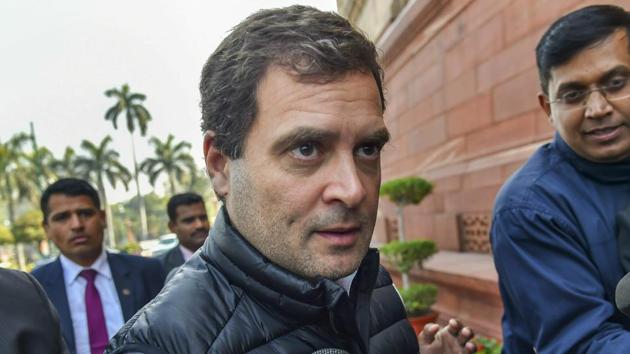Rahul Gandhi spells out his 2019 agenda
One can agree or disagree with Congress president Rahul Gandhi’s views, but his willingness to take questions and be challenged is a positive democratic trait.
In one of his most wide ranging interviews in recent times, Congress President Rahul Gandhi spoke to this newspaper and gave a glimpse into his broader world view, the issues that he believes will define the 2019 election, his dynamic with the rest of the opposition with which Congress shares both a cooperative and competitive dynamic, the question of leadership of a future government, and, most importantly, his own vision to take India forward. One can agree or disagree with Gandhi’s views, but his willingness to take questions and be challenged is a positive democratic trait.

There are three big messages that emerge from the conversation. Mr Gandhi has a sharp sense of the political economy challenges that confront India. He is accurate in his assessment that creating jobs and addressing the agrarian distress, particularly boosting farm incomes, are essential. With a relentless focus on these twin issues, Mr Gandhi has succeeded, over the past year, in pushing the Bharatiya Janata Party (BJP) on the defensive. But the Congress president’s prescription for these problems needs deeper thought. On jobs, he focuses on manufacturing, skills, and small and medium scale industries — all good ideas, but this is not very different from the set of ideas that Prime Minister Narendra Modi pushed when he started out. Remember Start Up India, Make in India, Skill India, Mudra. On agriculture, while the party’s politics has revolved around farm loan waivers, his recognition that a broader approach is needed is again similar to what Mr Modi has said. What the Congress needs to offer is thus a more detailed policy prescription, which identifies why some of these solutions have been difficult to achieve. That will make the alternative agenda more convincing.
The second theme is more political. Given that the BJP will posit the election as one between strong and decisive leadership versus chaos, Mr Gandhi has turned it around and made the very absence of a common opposition leader and the multiplicity of parties into a virtue. This has allowed him to frame the battle as one between diverse, democratic formations versus an authoritarian leader. This is shrewd — for Indian polity is plural, and this framing allows parties with competing ambitions to work together. But it is not an easy message to sell to an impatient electorate. Voters increasingly decide their politics based on the issue of leadership. Many also believe that coalitions end up imposing excessive constraints and impede governance. The trend in recent years is thus for clean mandates in favour of one side. Mr Whether Mr Gandhi’s message of chaos leading to order will resonate is therefore to be seen.
And a third theme that strongly emerges is Mr Gandhi’s belief that the current government has trampled on institutions, from the judiciary to investigative agencies. This is a concern that is widely shared by the rest of the opposition as well as a major section of civil society. Mr Gandhi is right in articulating it. But here is the problem. While there could be a difference of degree, the Congress’ own treatment of institutions, and willingness to use it against rivals, erodes its moral standing on the issue. If Mr Gandhi truly wants to make a statement and be credible on the issue, he must commit to a pledge or charter of respecting institutional autonomy, and the checks and balances that exist in the Constitution. But put together, despite the need for deeper reflection, it is these three issues of political economy, coalitions and institutional autonomy which will define the election.






